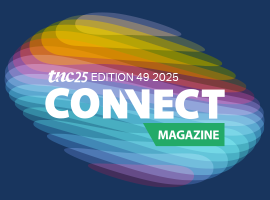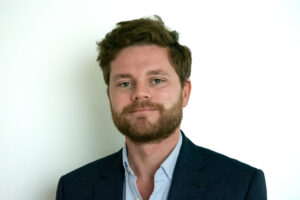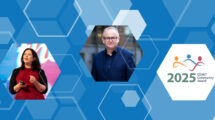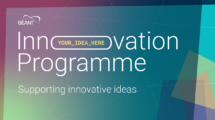From 6-9 June 2024, the citizens of European Member States voted for a new European Parliament. While there was pre-election concern about “Europe losing its middle”, the results merely showed the continuation of the weak trend towards the far-right, but allowing for the mainstream and centrist pro-EU parties to hold the middle. Subsequently and much quicker than expected by many, the European Council and European Parliament elected Ursula von der Leyen for another five years as European Commission President, choosing stability and continuity for the EU. The Commissioners’ College was presented by Ursula von der Leyen in September 2024 and has since been approved. Showcased in parallel at this time and reflected in her subsequent mission letters to each appointed Commissioner, her priorities became clear. In her address at the end of last year, she highlighted Prosperity, Security and Democracy as her and Europe’s priorities for the next five years.
But why should this matter to GÉANT and our community?
When working in policy, it is quite easy to become distracted by new buzzwords that hold little practical, applicable or implementable value. It is also common to come across hollow statements that are well-meaning but vague. The difference with this set of political guidelines is that they will set the scene for the next five years of policymaking. It is within this language of Prosperity, Security and Democracy, that European legislation will be written. As such, these guidelines have set the language of policymaking for the foreseeable future. It is advisable therefore to see where we sit within it, from both a legislative and budgetary point of view.
Starting with a new lens
Aligning the core work of NRENs and GÉANT to that of ‘Prosperity, Security and Democracy’ is a daunting, if not impossible, task. Yet, when one delves into the different levels of the service delivery chain that we provide to our members and end-users, the exercise is surprisingly fruitful, and even conducive. The answer being that these three aforementioned areas could not do without our contributions as a community. The future of connectivity, the ensuring of trusted access to big data and computing, and the success of transformational projects are three core capabilities that GÉANT and the NRENs enable. Via these three areas, we provide robust support for R&E in and beyond Europe, even in an unpredictable environment. What follows is how this can be made possible.
From the Big Five to the Big Three
Over the last four years, within GÉANT and in collaboration with the NRENs and our broader community, we have referred to our core strategic priorities as the “Big Five.” These represent the key pillars of interest and engagement for our community: the GÉANT project itself, the European Open Science Cloud (EOSC), the EuroHPC initiative, the growing field of Quantum technologies, and our expanding portfolio of international activities. This framework has helped guide and focus our work, encouraging structured community dialogue, coordinated actions, and sustained engagement, particularly around EOSC and EuroHPC. It has also spurred increasing momentum in Quantum technologies. The GÉANT project steadfastly continues to deliver, with GN5-1 successfully completed and GN5-2 now underway. Our international engagement continues, through initiatives such as Medusa and Blue Raman, all contributing to the global gateways. The GN5-IC1 project, complemented by an expanded Network Infrastructure Advisory Committee mandate, ensures inclusive participation and support from the entire community.
One growing problem with this categorisation, however, is that it did not account for changes in the wider digital landscape. EOSC had arguably joined one of fourteen Common European Data Spaces or CEDs, which as we know focus on all sorts of thematic areas – from eHealth to tourism. New aspects of technology, such as cable sensing, which were gaining ground in the SUBMERSE project and many national initiatives, could not be accounted for in the Big Five. Nor could our place in future contributions to the fast-growing pace of Artificial Intelligence. Is there a new way of conceiving our environment, and more importantly, a way which would be relatively futureproof and not subject to multiple revisions? Such a thing would certainly be useful considering the fast-changing environment we currently live in.
As policies and initiatives wax and wane, the one constant that we should be proudest of is the services GÉANT and the NRENs provide to our members and users. They are used by our community because they work well and are essential or useful for R&E. Hence, rather than letting large digital initiatives dictate our focus, it made sense to see how our core and growing / innovative service areas and projects could be portrayed in a more simple, all-catching way. One way is to look at how the GÉANT project services can be portrayed in a simplification of our work into the three themes of Secure Connectivity, Data Access and Digital Transformation. These three themes seem to provide a home for what we provide from Work Packages 1 – 9, albeit often with overlap or indeed all three areas being covered. One could also place here the services we provide to the Big Five within these blocks – imagine EOSC being related to Data Access, or QKD being a topic of the Digital Transformation. Our cable sensing endeavors could be there too. Most helpfully, this structure allows project participants, NRENs, national policymakers and the EC, to explain what we do in a simple, condensed way. And it matches the new political guidelines of the Commission.
A Strong & Secure Europe – Secure Connectivity
Secure connectivity is essential for a strong and secure Europe because it underpins the resilience and trustworthiness of the digital infrastructure that supports critical sectors such as healthcare, manufacturing, energy, finance and public administration – to mention some not including our own. By safeguarding networks against cyber threats, hostile interference, and data breaches, Europe can protect its national security, maintain public trust, and ensure the continuity of essential services. It also enables economic growth by cultivating innovation, supporting cross-border trade, and creating a stable environment for digital entrepreneurship. Furthermore, secure connectivity enhances the EU’s strategic autonomy by reducing dependency on non-European technologies and ensuring that European data and communications are governed by EU laws and values. It strengthens the Union’s capacity to respond collectively to cyber incidents, promotes digital sovereignty, and reinforces democratic institutions by preserving the integrity of information and communications. In this way, secure connectivity not only shields Europe from external threats but also empowers it to lead in the global digital landscape with confidence and unity.
GÉANT plays a vital role in enabling a strong and secure Europe by enabling public data transfer for R&E, reducing dependence on large global platforms, and giving options to Europe with self-reliant digital capabilities. At the core of this value proposition is a secure and reliable network for the European research and innovation ecosystem. This secure connectivity is fundamental to the GÉANT project and international collaborations, supporting the European Research Area integration, the Digital Rights and Principles, and the EU’s vision for digital sovereignty and strategic autonomy. Through entry points with NRENs, the community supports the “right to stay” and fights the “geography of discontent” created by unequal geographical distribution of R&E excellence hubs. This secure connectivity is vital, across the EU, Candidate countries, Neighbourhood regions and beyond.
A Free & Democratic Europe – Accessing the new data landscape
Enabling data access services contributes to a free and democratic Europe by giving transparency, accountability, and informed decision-making across societies and institutions. By making data—especially public and non-personal data—accessible, individuals, civil society, journalists, and researchers can scrutinise government actions, participate meaningfully in democratic processes, and advocate for policy improvements. It also empowers citizens with information to make informed choices and strengthens public trust in democratic institutions. It goes without saying that it also allows scientific collaboration across borders and boundaries. Open data supports innovation and equal economic opportunities by allowing businesses, including startups and small and medium-sized enterprises (SMEs), to develop new services and compete fairly. Additionally, access to high-quality, interoperable data enables cross-border collaboration, supports evidence-based policymaking, and helps ensure that digital technologies serve the public good rather than reinforcing centralised control or surveillance. Ultimately, data access under European values ensures that digital transformation aligns with human rights, inclusivity, and democratic governance.
GÉANT enables a free Europe by supporting critical research and innovation initiatives such as EuroHPC and EOSC, especially by underpinning these with democratic, non-discriminatory access to data and computing resources. Leveraging Trust & Identity technologies like MyAccessID, the project maintains a robust federated identity management (FIM) solution which is increasingly taken up in Europe’s frontline research initiatives. The roll-out of scalable, federated, interoperable architectures is the solution to ensure timely maintenance of the infrastructure and to balance the needs of data users and holders.

A Prosperous & Competitive Europe – Our role in the digital transformation
The digital transformation helps build a prosperous and competitive Europe by driving innovation, increasing productivity, and enabling new business models across all sectors of the economy. By integrating advanced technologies such as AI, cloud computing, Quantum, 5G, and the Internet of Things, European industries can modernise their operations, reduce costs, and respond more efficiently to global market demands. It supports SMEs in scaling up and accessing international markets, while also attracting investment and talent to the region. But the digital transformation also enhances public services, education, and healthcare by making them more efficient, personalized, and accessible, which contributes to social wellbeing and workforce readiness. It also fosters a more sustainable economy by enabling smart energy systems, digital agriculture, and circular economy solutions. This includes new methods of scientific experimentation and understanding.
Inherent to a community of innovators, the current iteration of the GÉANT project (GN5-2) continues to drive the digital transformation necessary for the EU’s competitiveness and prosperity via the community’s underlying services, access and identity management, and our new above-the-net developments. The needs of the end-users can be pooled and matched, e.g. through OCRE2024. The state-of-the-art network is ready for the increased data traffic expected from integration of data markets and the increased use of AI. Beyond that, Quantum testing on GÉANT’s closed network shows promising potential, while other emerging areas such as Time and Frequency and cable sensing offer exciting tools and alternative paths for network understanding that can be explored.
Looking forward
With CONNECT, ACCESS, TRANSFORM our community can speak a common language with the national and European policymakers. The need for this has been proven and acknowledged in the positive evaluation of the GN5-2 SGA proposal, where our proficiency in understanding the new priorities has been demonstrated. “Knowledge and experience are shared within this community, to constantly enhance quality and security of services indispensable to the ERA, instrumental to EU strategic autonomy,” are the final words of the evaluation’s abstract. Speaking the same language is essential if we wish the relationships between ourselves and our stakeholders to continue growing positively. It is also essential when we deliver the key needs of our end-users to policymakers, and when policymakers are trying to explain their political aims in a way we understand. If we endeavour to continously close this gap, then our purpose of providing support to Europe’s researchers and educators will be made clearer and clearer to those who wish to understand, and support.

Read the full online magazine here







